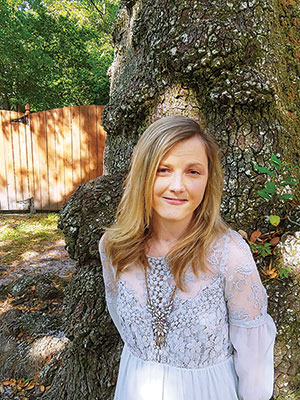Where my heart was concerned, I thought I’d held up my end of the bargain.
I’ve always been aware that my faulty aortic valve needed regular monitoring. When I was 8, I’d undergone balloon valvuloplasty to widen my stiff, narrowing valve, and while I had only a vague grasp of what was done and why, I understood its importance.
So even in adulthood, I didn’t skip cardiologist visits. As a military spouse, who was sometimes stationed in unfamiliar places for six months or fewer, I still underwent the required tests every year or two.
For more than 15 years, the doctors I saw didn’t volunteer much information, and I didn’t ask many questions. After all, no news must be good news, right?
My assumptions seemed validated by a cardiologist visit in 2017, while my husband and I were living in Charlotte. I went through all the familiar rigamarole, along with some tests that were new to me, and the doctor had me feeling positive about the state of my heart.
When we moved to the Coast in 2018, it was time for another checkup. The same tests were ordered, and I’d expected the same result. But about a week later, a call came alerting me that my aortic stenosis probably would require surgery.

I’m ashamed to admit that the next thing I did was Google aortic stenosis. I knew my valve didn’t function properly, but embarrassingly little about why.
A catheter procedure was ordered in advance of open-heart surgery. When I awoke afterward, I learned that my valve was in such sorry shape that the surgeon didn’t feel comfortable sending me home.
My mind reeled; how could I not know this? Had I not done what I was supposed to?
My main takeaway from the experience was to be a more engaged patient. Pay attention to your body, and don’t dismiss things that seem off. If you aren’t satisfied with a diagnosis or treatment plan, get a second opinion. I’m no longer shy about asking for further explanation or for something to be checked.
Ultimately, you must be your own best health advocate. If you have been diagnosed with a condition, make sure you understand it, its implications and your role in managing it. Understand how your health insurance works. Take advantage of preventative care, which is offered for free under many plans. Don’t assume that showing up for appointments is where your responsibility ends. If you got tested and don’t hear anything within a reasonable timeframe, follow up.
The same goes for your loved ones. Chances are, if it hasn’t happened already, you’ll need to speak on another’s behalf in a medical capacity. Don’t hesitate to voice your thoughts or observations. Something that may seem trivial may be illuminating — or indeed, life-saving — when shared with a medical professional.
And definitely keep an eye on your heart. I feel fortunate that mine has been under such scrutiny. If everyone’s heart were watched as closely, we would lose far fewer people to cardiac-related conditions, which often go undetected. As it stands, someone dies every 36 seconds from cardiovascular disease. It remains the leading cause of death across demographics. If you experience symptoms such as shortness of breath, chest pain or numbness or weakness in your extremities, don’t delay in discussing them with your doctor.
Taking care of your physical wellbeing, while inconvenient at times, is the ultimate act of self-care. Empower yourself with knowledge, and be your own biggest champion. You and your health are worth it.
Jennifer Gentile is contributing writer and editor with Gulf Coast Woman Magazine. Reach her at jen@gulfcoastwomanmagazine.com.


